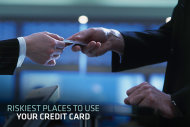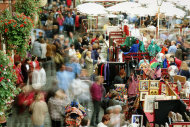 Even if you use the utmost caution, you can still be a victim of credit card fraud. Credit card companies and banks are more and more often putting the onus of catching phony or incorrect credit card charges on the consumer.
Even if you use the utmost caution, you can still be a victim of credit card fraud. Credit card companies and banks are more and more often putting the onus of catching phony or incorrect credit card charges on the consumer. The most important thing is to check your billing statment, of course. And there are organizations like Creditcards.com that offer tips on how to keep your cards safe as well. Here, we take a look at 10 of the riskiest places you might use your card, according to Creditcards.com , and what you can do to avoid the dangers.
Non-bank-owned ATMs
Encryption at these ATMs is often not as good as at bank ATMs, meaning some locations are just not as safe. These ATMs also are more likely to be hacked. And in some cases, people have put up devices that look like ATMs but don't give out cash. Instead, they are just card-skimming devices aimed at stealing your credit card or debit card information.

Flea Markets
Flea market merchants are often transient and can be difficult to locate if there is a problem with charges. It's especially true for vendors who don't have online credit card terminals and instead make carbon copies of your credit card.
That doesn't mean those vendors are necessarily fraudulent, but it makes the transaction less secure. The credit card company might have trouble doing a charge back. If you're going to the flea market, take cash. It's also easier to negotiate that way.
Small Shops/Cafes in Foreign Countries
General common sense. Any safe, reputable e-commerce site is going to have a secure checkout page, like the one shown at left. If that doesn't appear, it should be a red flag. You can almost be sure it's not legitimate, and even if it is, you're opening yourself to that transaction being seen by others.
Wi-Fi Hotspots and Public Computers
If you're going to be making online transactions over an unsecured wireless connection like in cafes, parks and other hot spots, data can be compromised or seen while in transit, even if you're on a secure page while you're checking out. The same goes for public computers like in libraries. It's not advisable to ever transmit personal data when you're in a public connection environment, especially on non-secure wireless.

No comments:
Post a Comment
Thank you for your comment.